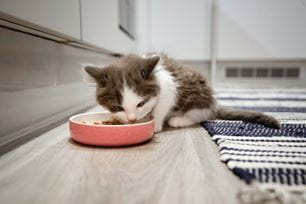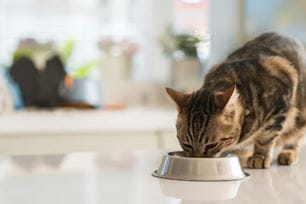
As your cat grows and graduates from one stage of life to the next, their dietary needs will change as well.
As a kitten, your pet grows quickly and needs higher amounts of everything—nutrients, vitamins and minerals. Consequently, kitten foods are usually packed with calories to help keep up with the fast-burning metabolism of young animals.

However, once your cat reaches maturity, they no longer need quite so many calories and nutrients. In fact, an adult cat eating food meant for kittens will become overweight rather quickly. So once your cat has reached their full growth, transitioning them to an appropriate adult diet is best.

Just like people, your cat's metabolism will keep slowing with age. So when your cat becomes a senior, they will need food with even fewer calories. Most senior food achieves this by reducing carbohydrates and increasing the fiber content in the food. That way your cat still feels full even though they are eating less calories.
Many senior foods are also fortified with additional nutrients and supplements that support senior health. For example, fatty acids, like the ones found in fish oils, help maintain joint, coat and heart health. Meanwhile, antioxidants reduce the normal brain deterioration that occurs because of aging.
Nutritional requirements can vary greatly with age. Feeding a diet that matches the needs of each life stage will help your cat maintain optimal health.
Your veterinarian can recommend a proper diet for your cat as they enter each stage of life.